No Help From America
Air Date: Week of February 14, 2025
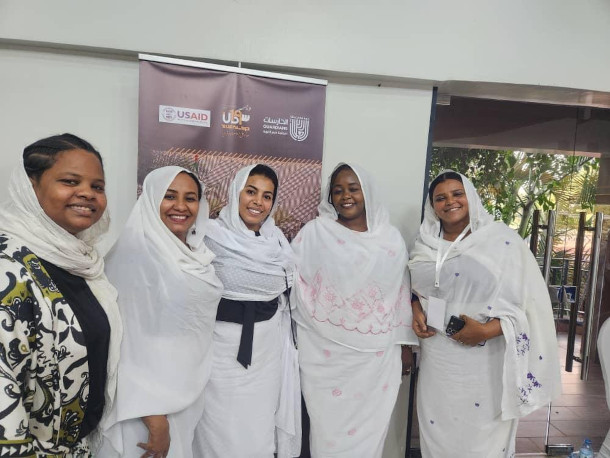
Climate and environmental activist Nisreen Elsaim (far left) volunteers in Doha, Qatar, with the Female Guardians of the Revolution (right), a Sudanese NGO that serves the therapeutic and psychological needs of female refugees. Elsaim is concerned that the Trump administration’s shutdown of USAID could not only have devastating immediate consequences but could scar the fabric of American foreign policy for decades to come. (Photo: Nisreen Elsaim)
The Trump administration’s attempt to freeze all foreign assistance and bid to lay off nearly all USAID staffers are bringing disastrous consequences for millions of acutely hungry people, including those in war-torn Sudan. Nisreen Elsaim is a Sudanese climate and environmental activist and joins Host Jenni Doering to describe the desperate situation and send a warning to the US about the perils of isolationism.
Transcript
BELTRAN: From PRX and the Jennifer and Ted Stanley Studios at the University of Massachusetts, Boston, this is Living on Earth. I’m Paloma Beltran.
DOERING: And I’m Jenni Doering.
In 1961, President John F. Kennedy founded the United States Agency for International Development. USAID was the right hand of American soft power during the height of the Cold War. Agency staff and contractors fanned out throughout the developing world bearing the fruits of America’s bounty, like health care, nutrition, infrastructure and education programs. And for populations ravaged by war and famine, USAID funding and supplies provided an invaluable lifeline.
BELTRAN: But this lifesaving work has been thrown into chaos with the Trump administration orders to freeze all foreign assistance and lay off nearly all USAID staffers. To get a better picture of the impact on one of the most vulnerable populations in the world we reached out to Sudanese climate and environmental activist Nisreen Elsaim. Nisreen fled her home in Khartoum with her infant son following the outbreak of the fighting between two rival military factions in 2023. Climate disruption from extreme droughts to floods has aggravated the humanitarian crisis, and now the UN says nearly 25 million people, or half the Sudanese population, face acute hunger.
DOERING: Nisreen spoke to us from Doha, Qatar where she is a volunteer with Sudanese NGO, Female Guardians of the Revolution, which provides psychological and therapeutic support for women refugees. Please be aware our discussion contains events and conditions you may find distressing, including mention of sexual violence.
Nisreen, welcome back to Living on Earth.
ELSAIM: Thank you very much for having me again, and I really hope that one day you will host me in better news.
DOERING: Me too. Now, NBC and other media outlets are reporting that hundreds of community kitchens across Khartoum, Sudan, are being shuttered because of the USAID shutdown. Can you share some of the stories that you've heard?
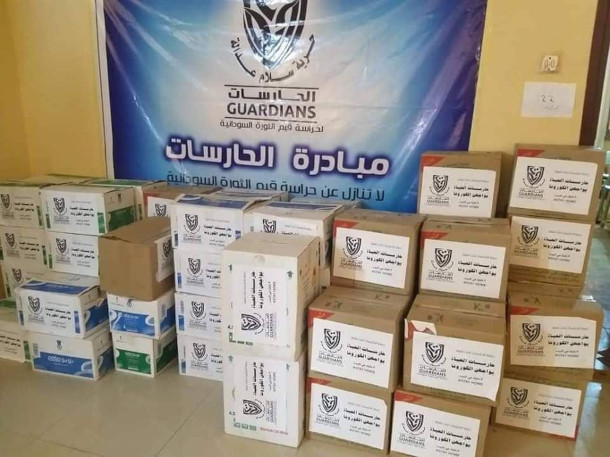
Ramadan, the Islamic holy month of fasting, begins on March 1 in 2025. Female Guardians of the Revolution prepares packages of fruits, nuts, spices and other items for refugees to eat after their daily fast ends. Their staff and volunteers prepare packages in Sudan, Uganda and Egypt. Female Guardians of the Revolution usually receives assistance from the U.S. Agency for International Development in the preparation of Ramadan packages. (Photo: Nisreen Elsaim)
ELSAIM: Yes, so when the siege was built around many, many of the big neighborhoods and cities inside of Sudan and especially in Khartoum, the only way to make food access to people is through the community kitchens. And at the beginning it was purely support from Sudanese diaspora, from people who managed to flee the war but thought of their neighbors, from people who had some savings and could not eat alone. And then it developed into a big initiative, and USAID was one of the biggest supporters to them. And it is very important to highlight that Sudan reached stage five famine more than three times over this two years, which means that the malnutrition situation and access to food is very critical, and food insecurity is the biggest headline of this war right now, unfortunately. And all of this is quite impacted right now by the stop of USAID.
DOERING: What other aid efforts are being disrupted?
ELSAIM: Well, I think health is a huge problem right now in Sudan, because there is no sanitation systems; because of the cholera breakout, the dengue fever breakouts and malaria breakouts. There was a huge aid sector for medicine and hospitals and moving clinics that also stopped. USAID was also one of the biggest supporters for the psychological support that many of the big organizations inside of Sudan, outside of Sudan were giving to the victims of rape, to the victims of the war, people who have traumas from the killing and from the blood and from everything. And I think even if you are hungry one day or two days, then you can eat on the third day. But if you have depression, or if you reach a point where you want to kill yourself after being raped, or if you really need an urgent counseling, all of these activities were very much supported by USAID. I myself, sitting right now in an aid office for an organization. It's a women-led organization, and it's a feminist movement called Harissa, and Harissa is the Arabic name of the Female Guardians of the Revolution, and I can tell you that we worked with almost 10,000 victims right now since the war started, with continuous counseling, and all of these efforts are stopping.
DOERING: Nisreen, it sounds like the people who have been traumatized, especially women who have gone through horrible sexual assaults and need counseling, they will just have to endure going through this alone, more or less with fewer resources and comfort now.
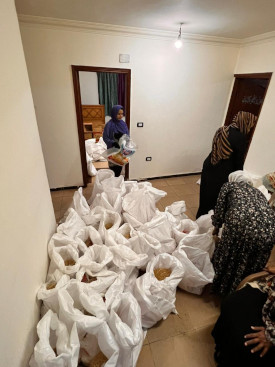
Female Guardians of the Revolution prepare supplies for refugees in their war-torn homeland, Sudan. With the shutdown of USAID operations, millions of refugees are in greater danger of starvation. (Photo: Nisreen Elsaim)
ELSAIM: Yes, and unfortunately, this is something not a lot of organizations work on, because, you know, normally, donors and funders, they have thematic areas that they work on. They have priorities. And I can tell you, not many organizations really have psychological support or mental health in their profile, which leaves a huge gap in this.
DOERING: I understand that USAID has actually provided some support to help during the time of Ramadan, which is coming up. Can you describe what that looked like?
ELSAIM: Yeah, it's normally food. And we used to do what we call Ramadan bag, which is a bag of solids and seeds and oil and some spices and some rice and stuff for people who will be fasting the holy month, and also USAID was a huge supporter for us to do that. And now we keep receiving emails and messages and phone calls asking if we will be able to provide Ramadan bags this year or not, and we are in a continuous search for alternatives. But unfortunately, time is too short. I mean, the decision was so sudden to the point that people now can't find alternatives this quickly, which means that a lot of time-sensitive things like medical support, like Ramadan bags, for example, because it's bounded by Ramadan as a time itself and many other initiatives will have to unfortunately stop this year.
DOERING: Now, given the impact of the climate crisis and the war, how does the interruption of USAID funding and operations further complicate life for the Sudanese people?
ELSAIM: Yes, well, I think the problem is even bigger than USAID, because Trump, if you remember, he pulled out of the Paris Agreement for the second time. And I think especially with climate change, because climate change is not a borders bounded problem. It's not like the war. When you cross the border, then you are in a different country and different reality. Climate change will hit everyone, and you in the U.S. have a very, very recent example of the wildfires that happened in California, and it ate, I'm talking about the fire, but burned and ate one of the most expensive places and houses in the US in general. They didn't say, “Oh, this is celebrities’ houses. I will not touch it. Oh, this is poor people houses. I will just burn it.” It burned everything and everyone. So climate change is not, unfortunately, a problem that is border bounded, and Trump is very much known as a climate denier and it’s not only the USAID, it's not only pulling out of the of the Paris Agreement, but even the White House pages online about climate change is down. If you try to enter any of their pages, it's no longer there. I think re-electing him was a huge setback to the democratic processes of the United States of America as a free country, as a country of opportunity, as a country of law and a country of democracy, I think so.
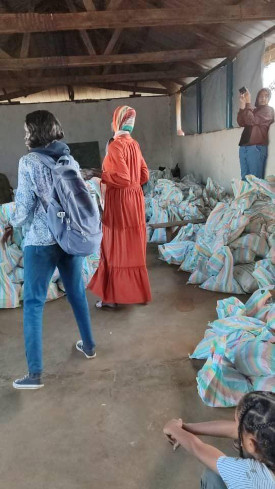
March 1 is the first day of Ramadan 2025. During the holy month, observant Muslims abstain from food and drink from dawn to dusk daily. Female Guardians of the Revolution prepare packages for distribution to refugees in Egypt. (Photo: Nisreen Elsaim)
DOERING: Nisreen, as a humanitarian and an activist, what are your long-term concerns about the impact of the USAID shutdown and these other Trump administration actions?
ELSAIM: I'm really, really worried that institutional changes will happen. I'm really worried that the impact of this four years of Trump ruling the country will not remain in these four years like the previous duration when he was in power, but will leave scars that will stay in the American fabric and the international situation for many years, maybe for decades. I mean, we can only remember what George Bush, the son, did when he entered Iraq. And the Iraq war is still a huge black page in American history, and people are still talking about it, and Iraq still haven't recovered very well. Unfortunately, what a great country like America do does not only impact America, and does not only impact the country, and it does not end by the end of the election period for the candidate, it stays for decades and maybe forever.
DOERING: Now supporters of the Trump administration might argue that other wealthy Arab and European nations should step up and fill the international aid void left by the US government. What's your response to that assertion, and how realistic is it?
ELSAIM: I think it's not about who's going to step up and close which gap, but it was the very good will of the American people and the taxpayers who decided to contribute their money, not only to their own wealth and health and welfare, but also the rest of the world. But if we took one example, for example, the climate change issue, it is an obligation, historical obligation, but also scientific obligation, but the most important ethical and financial obligation to the U.S. because of the history of the emissions since the Industrial Revolution, to really help the developing countries to adapt to climate change and mitigate the emissions of the CO2 but also help other developing countries who have big emissions to shift to green energy. So it's not only a good will, but it's the current economic situation, and the current position of the U.S. in the world was gained by a lot of emissions during the Industrial Revolution, and these emissions are what is causing the climate change that we are all suffering from right now.
DOERING: It sounds like you're saying this isn't just a matter of charity, but of responsibility and duty.
ELSAIM: Definitely.
DOERING: Nisreen, if you could send a message to President Trump and the American people about the importance of USAID to the world, what would you say?
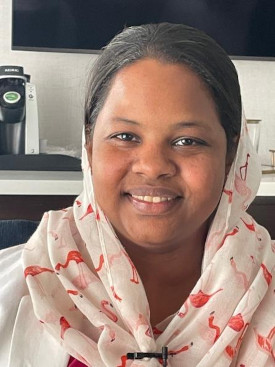
Sudanese Climate and Environmental Activist Nisreen Elsaim during 2024 Climate Week in New York City last fall. Elsaim is concerned that the shutdown of USAID complicates the already dire condition of refugees in her homeland and other troubled areas. (Photo: Nisreen Elsaim)
ELSAIM: I don't think really that I want to send any message to Trump. I don't think it's useful. But what I think it would be really useful to send a message to the Americans, and this message will be definitely what we say about climate change all the time: No one is safe. It's just like the COVID. No one is safe until we are all safe. It goes for everything, like, if you want democracy in your country, then we have to have a democratic world. And this is part of what USAID was doing. If you want a peaceful world, then you have to work for this peace. And this is also what part of what USAID was doing. If you want a healthy planet and healthy people and healthy country, and you don't want other pandemic, like the COVID, then you also need to talk about the health in the whole globe, not only the U.S. And if you remember that some things doesn't really know boundaries, and it will catch you wherever you are. I mean, look how big the distance between China and America, and look how much COVID was impactful, even to the Americans’ life. I mean, it's a very clear example that what happens outside impacts America, and what happens in America impacts the outside.
DOERING: Nisreen Elsaim is a Sudanese environmental and climate activist. Thank you so much, Nisreen.
ELSAIM: Thank you for hosting me again.
Links
Operation Broken Silence | “Chaos Inflicted on USAID Intensifies Famine in Sudan”
NBC News | “A Lot of People Will Die’: How Trump’s USAID Overhaul Could Lead to Famine in Sudan”
NPR | “How the Gutting of USAID Is Reverberating Around the World: Worry, Despair, Praise”
Living on Earth wants to hear from you!
Living on Earth
62 Calef Highway, Suite 212
Lee, NH 03861
Telephone: 617-287-4121
E-mail: comments@loe.org
Newsletter [Click here]
Donate to Living on Earth!
Living on Earth is an independent media program and relies entirely on contributions from listeners and institutions supporting public service. Please donate now to preserve an independent environmental voice.
NewsletterLiving on Earth offers a weekly delivery of the show's rundown to your mailbox. Sign up for our newsletter today!
 Sailors For The Sea: Be the change you want to sea.
Sailors For The Sea: Be the change you want to sea.
 The Grantham Foundation for the Protection of the Environment: Committed to protecting and improving the health of the global environment.
The Grantham Foundation for the Protection of the Environment: Committed to protecting and improving the health of the global environment.
 Contribute to Living on Earth and receive, as our gift to you, an archival print of one of Mark Seth Lender's extraordinary wildlife photographs. Follow the link to see Mark's current collection of photographs.
Contribute to Living on Earth and receive, as our gift to you, an archival print of one of Mark Seth Lender's extraordinary wildlife photographs. Follow the link to see Mark's current collection of photographs.
 Buy a signed copy of Mark Seth Lender's book Smeagull the Seagull & support Living on Earth
Buy a signed copy of Mark Seth Lender's book Smeagull the Seagull & support Living on Earth

